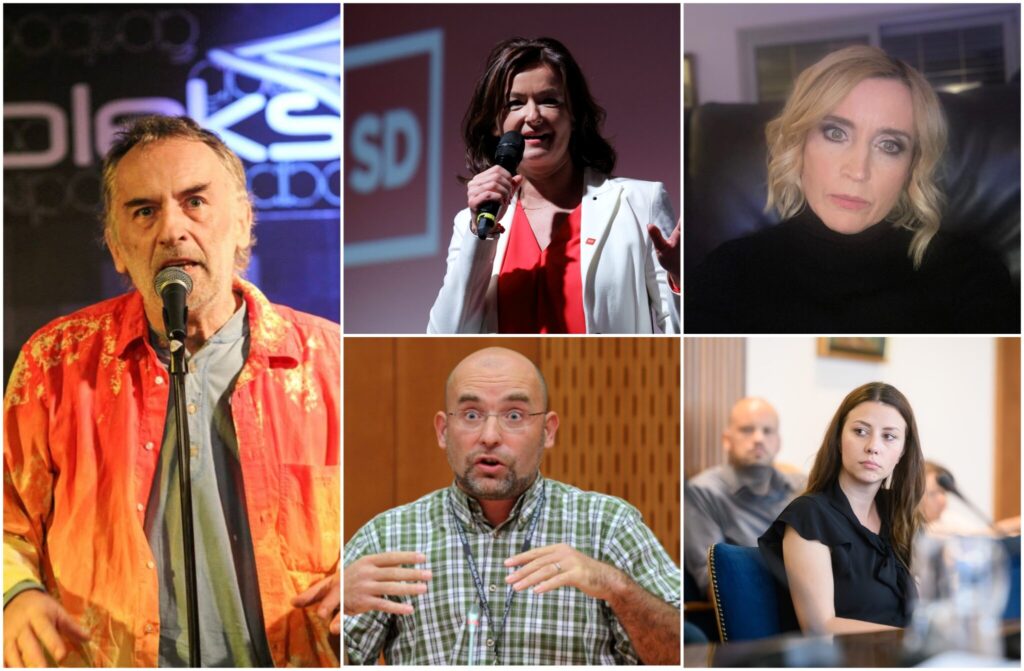The new transfers from journalism to politics or to the ruling party, the Freedom Movement, have caused quite a stir and also brought forth many questions – namely, why are so many journalists switching to politics, and why do they always join left-wing parties? And while they are tyring with all their might to convince the public that the transfers are, in fact, a reflection of the precarious state of the journalistic profession, this is very hard to believe, given that most of them were at fairly high positions on the pay scale. We are talking about the red bourgeoisie, earning 2.5 times the average wage. Such people do not switch to politics because they are so very poor…
The current issue of “independent” journalists crossing over to politics is causing quite a stir and raising a lot of questions. They say that the transfers reflect the precarious situation in journalism and that this is the reason for the switches, yet we all know, as it is common knowledge, that the reputable journalists from the national media outlet Radio-Television Slovenia (as most of them transfer from there, in addition to the largest commercial television station, POP TV), are paid quite well. It is hard to believe that money is the main motivator when they were all earning much more than the average Slovenian before they decided to switch to politics.
As explained to the Demokracija magazine by the Slovenian Broadcasting Workers’ Trade Union, which represents the majority of the creative and technical staff of our public media outlet, among the highest salaries paid at RTV, which were made public in November and December of 2021, the first 29 people on the list of the top 50 highest paid employees were journalists. And then, in April and May, this number was 25 out of 50. The 50 highest salaries range between 5,071 euros and 4,157 euros. The unofficial figures for the May journalist-editorial salaries paid in June 2022 were not too different from the previously published data either, with the top 50 highest salaries ranging between 5,260 euros and 3,430 euros gross. Political analyst Mitja Iršič also doubts that salary was the main motivator for journalists to switch to politics, noting that journalists were already being paid well before their transfers, even in the past.
“I cannot think of a single journalist who was earning minimum wage being accepted into the left-wing political cream of the crop. Politics is not a Social Work Centre, where journalists can try and fix their existential problems, like artists do at the Ministry of Culture – politics is for the red media elite,” Iršič pointed out. It should also be stressed that in this case, we are not talking about people who were balancing on the poverty line. Tamara Vonta, for example, was a “prime-time news anchor,” and they supposedly have special contracts, similar to those of directors. The same was true for Irena Joveva, who was a so-called “prime-time investigative journalist” (although it was more Damir Črnčec who was doing the investigation on her behalf), and who probably also had a special contract, the salary of which was likely not much lower than the one she has now, in Brussels, as a Member of European Parliament.
Rather than a reflection of the precarious state of the journalistic profession, as some would like to portray it, this is, in the opinion of some, primarily evidence of the political bias of the mainstream media, or rather of the media-political coalition that controls Slovenia hand-in-hand. Let’s be real, the list of journalists who left journalism to join (left-wing) politics, published by a Twitter user, is not only very long, but it seriously calls into question the entire credibility of the mainstream media, which have all along defined themselves as “independent,” but are now serious political players.
The list includes the following people: Nataša Pirc Musar (lawyer and presidential candidate), Tanja Fajon (president of the Social Democrats and MP), Mojca Pašek Šetinc (Freedom Movement MP), Irena Joveva (MEP), Blaž Zgaga, Tomaž Modic, Melita Župevc, Marta Kos, Majda Širca, Dejan Karba, Tamara Vonta, Jonas Žnidaršič, Mitja Meršol, Danica Simšič, Vesna Vuković, Petra Bezjak Cirman, Primož Cirman, and others.
More than 90 percent of Slovenian journalists who have decided to put down their journalistic pen and enter the political arena have joined the political left. “This says a lot about the structure of the media space in our country,” Dr Matevž Tomšič, President of the Association of Journalists and Publicists, has pointed out in the past. While it is a legitimate option for journalists to switch to politics, going back to journalism contributes to the loss of their credibility. Iršič also agreed with this, mentioning the American tradition, where “a journalist who has entered politics is considered dirty by default. They are taught in schools not to do that under any circumstances. And if they do, they are never to come back and claim impartiality. Politics is the art of partisanship. The pure antithesis of journalism.”
The idea of a serious journalist running for office is generally rejected in the USA – the Society of Professional Journalists discourages it, and the ethics rules of major newsrooms forbid it.
Tanja Brkić


